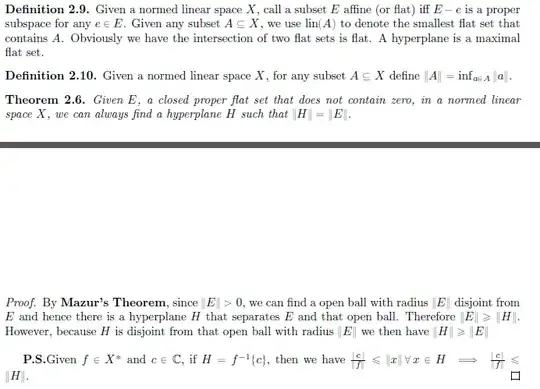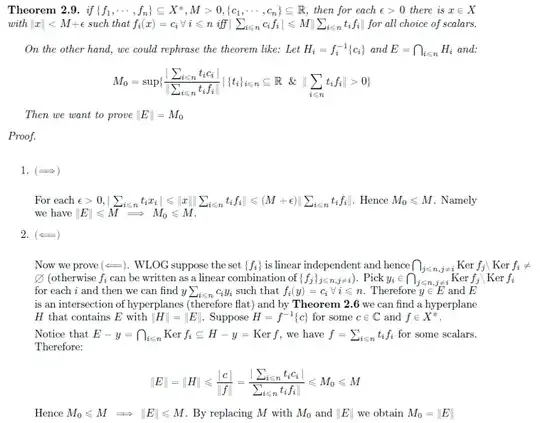The following result is from Chapter II in Normed Linear Space written by Mahlon M. Day
Helly's Condition: In a normed linear space $X$, given a finite set of bounded linear functionals $\{f_1, \cdots, f_n\}$, finite set of real constant of the same size $\{c_1, \cdots, c_n\}$ and $M > 0$, we have: for each $\epsilon>0$ $$ [\exists\,x \in X\hspace{0.5cm}f_i(x) = c_i\,\forall\,i \leq n]\Longleftrightarrow [\vert\,\sum_{i \leq n}t_i c_i\,\vert \leq M\|\sum_{i \leq n}t_i f_i\|\,\forall\,(t_1, \cdots, t_n) \in \mathbb{R}^n] $$
A Proof is attached at the end of this post. My question is:
Assume everything else in the definition is fixed except that the equivalence becomes: $$ [\exists\,x \in E\hspace{0.5cm}f_i(x) = c_i\,\forall\,i \leq n]\Longleftrightarrow [\vert\,\sum_{i \leq n}t_i c_i\,\vert \leq M\|\sum_{i \leq n}t_i f_i\|\,\forall\,(t_1, \cdots, t_n) \in \mathbb{R}^n] $$ where $E$ is a proper subset. Please provide sufficient conditions (ideally a necessary one) on $E$ for this new statement to hold. When $E$ is a subspace the new statement will surely hold.
Within the proof, a well-known result is used, which is: given $\{f, f_1, \cdots, f_n\}\subseteq X^*, f \in \operatorname{Span}\{f_1, \cdots, f_n\}$ iff $\bigcap_{i \leq n}\operatorname{Ker}f_i \subseteq \operatorname{Ker}f$. One can find the proof here. Again a "local version" of this result will be $f\vert_E \in \operatorname{Span}\{f_1\vert_E, \cdots, f_n\vert_E\}$ iff $E \bigcap_{i \leq n}\operatorname{Ker}f_i \subseteq E\bigcap\operatorname{Ker}f$ where $E$ is a proper subset of $X$. I would like to know sufficient conditions on $E$ for this new statement to hold.
Proof of Helly's Condition:

